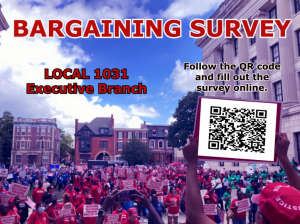Dear Members,
Happy New Year! We’re writing today to share some important info that directly impacts you and your family. 2023 is going to be a big deal for state workers. Our current contract expires on June 30th, and CWA has just begun bargaining for our next 4-year contract. In order to get the best contract possible, it’s going to take all of us fighting together!
Only members of the union get to have input into the contract proposals, and only members vote on the final contract – these are rights and privileges we gain by committing to standing together.
Being a union member is an investment in ourselves and our family. The commitment to each other is what gives our union power, because it shows the boss that we have each other’s backs and will fight for what we deserve: dignity and safety in the workplace, and a fair contract that provides economic security for all CWA members and our families. With bargaining about to start, now is the time to stand with your co-workers and join the union!
Here is a link to our CWA electronic membership card – please download and type in the highlighted boxes (including your signature), and then email it back to CWA Local 1031 at info@cwa1031.org .
Did you know that last year, CWA had three major accomplishments?
- After years of fighting to make sure our pensions are properly funded, the State not only made the full pension payment, an additional $500 million was included.
- When hit with a more than 20% increase in health benefit premiums, the union fought back and negotiated it down to 3%, which for most members amounted to just a few dollars per pay period. It was the first increase in 3 years!
- CWA worked with other public sector unions to get the Responsible Collective Negotiations Act (RCNA) passed and signed into law. This is the most important pro-union legislation passed and signed into law in three decades, expanding what we can negotiate for to include some vital aspects of our jobs like anti lay-off and anti-privatization job security language. Among the other things this bill does, it allows unions to charge non-members the cost of arbitration in discipline. Depending on the amount of days needed to present the case, the cost of arbitration can run from a few thousand dollars to in excess of $10,000. In order to be eligible to have the union pay for an arbitration case, you must be a full, dues paying member before to being called in to a Weingarten meeting, the time you become aware that you are being investigated for possible discipline. Otherwise, you would be responsible for the entire cost and you must pay a significant portion up front.
We need to build as much power as possible to bargain this next contract. Our union power is based on state employees like yourself standing side by side with your co-workers as CWA members.
Here is the link again that connects you to an electronic signature card.
We’re happy to answer any questions you may have so don’t hesitate to reach out to your Branch President for more information.
In solidarity,
Dennis G. Trainor, Vice President CWA District 1
Fran Ehret, NJ Director CWA District 1
John Rose, President Local 1031
Migdalia Santiago, President Local 1032
Gaye Palmer, President Local 1033
Adam Liebtag, President Local 1036
Ken McNamara, President Local 1037
Shawn Ludwig, President Local 1038
Michele Long-Vickers, President Local 1040

